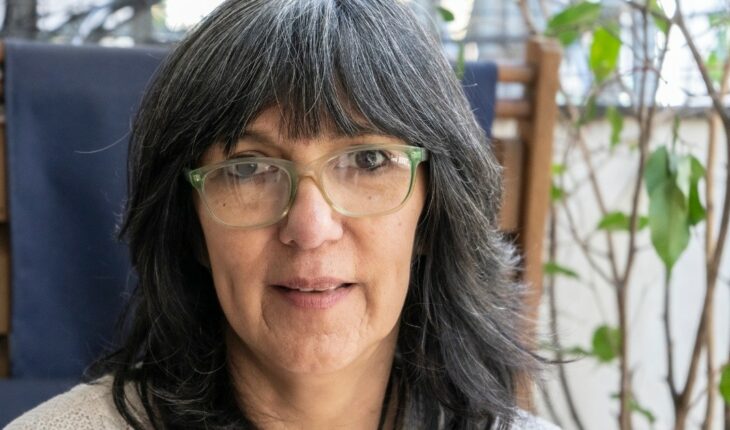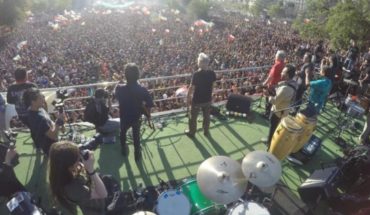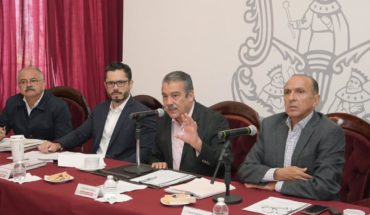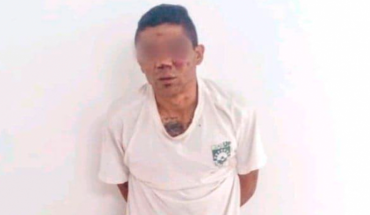Let it burn! That phrase is repeated over and over again. In the heat of November 19, 2019, gathered around a bonfire that illuminates the night of the port city, a large group of survivors of intanfil sexual abuse lists their abusers and join their voices in the same common cry. The silence: ¡que arda!***Alejandra Perdomo had been thinking about doing something about the subject some time ago. At the end of 2016 he began to investigate, collect testimonies and together with a “minimum technical team” build the first scenes. After six years of work, that project became “The Reparation”, his new documentary that has already premiered at the Gaumont Cinema.
“Reality is very strong and powerful and allows me to learn from the life stories and realities that I am getting to know. By working on these problems I feel that from my place I can contribute to making visible silenced issues and thus be able to change, even a little, the world, “reflects the director, in dialogue with Filo.news.Perdomo studied direction and production of video and television and script at ISER. Committed to social issues, she directed “Para la Libertad-Historias sobre ciegos” (short, 1997) and “Rompiendo Muros” (2001), about radio La Colifata de los internos del hospital neuropsiquiátrico Borda. “I began to study the audiovisual career with the intention of making fiction. The final thesis required us to make a short documentary; and so I had the opportunity to direct. I didn’t leave documentary cinema anymore,” he recalls. It was followed by “Born Alive” (2014), about the theft of babies and human trafficking in Argentina (the so-called irregular adoptions); and “Every 30 Hours” (2016), on femicides and violence against women.
Alejandra Perdomo | Photo: Courtesy of the press
“La reparación” is her fourth feature film as a director. It is a documentary that addresses the issue of sexual abuse in childhood and adolescence based on testimonies of victims, groups and specialists. An issue that society refuses to see, and often chooses to ignore. “It is a very complex issue, and it also has to fight against the resistance of a society that refuses to address the issue. People prefer not to talk about certain things, and silence only suits abusers; by remaining silent, what we do is to help the voices to be silenced and that these crimes do not come to light,” he says. The interviewees were Mónica Cortinez, Felicitas Marafioti, Daiana Fernández, and Santiago Bustince. He also gives the floor to specialists such as Roberto Piazza (victim and promoter of the Piazza Law; Eva Giberti, psychoanalyst and creator of the Victims against Violence Program (Line 137); and Vinka Jackson, psychologist, writer, ASI survivor. Ethics of Care and Prevention of Sexual Abuse in Childhood, among others.
Roberto Piazza | Photo: Courtesy of the press
They also have the testimony of Daniel Sgardelis, survivor and complainant of the School for Deaf Children Obra “Antonio Próvolo” of La Plata: “With the help of an interpreter of LSA (Argentine sign language) we were able to conduct the interview. There I became aware of the importance of learning LSA and thinking about how we told its story. I was impressed to know his story, what he explained about the difficulties of access to justice,” confessed the filmmaker. The documentary addresses sexual abuse in childhood from different perspectives and institutions: education, religion, music, activism, justice and the state, families. How guilt, shame or trauma become protagonists of the stories, as always the veracity of the children’s story is questioned, but the guilt of adults is not questioned. Who defends the victims? “We believe all the nannies. We believe protective moms who submit to judicial violence. We believe that adults at the moment they can manifest their pain. We believe them,” read the activists that November 19, International Day of Struggle against Sexual Abuse in Childhood and Adolescence, outside the Congress of the Nación.La struggle of feminisms allowed to give visibility to issues that were historically taboo in our society. Slogans such as #YoSíTeCreo or #YaNoNosCallamosMás became the embrace for survivors and the collective hope of achieving a better future free of violence.
Photo: Courtesy of the press
“What I want to convey is a message of struggle, of strength from all the survivors who were able to make their stories visible and contribute, help, assist, and accompany victims. They create networks and ask for justice for changeTo see the reality of many who still cannot put into words what they lived at some point in their lives,” Perdomo reveals. According to UNICEF’s National Survey of Children and Adolescents, conducted between 2019 and 2020, 11% of women aged 18 to 49 in Argentina were victims of sexual abuse during their childhood or adolescence. In the pandemic, meanwhile, according to the Ministry of Justice and Human Rights, calls to line 137 increased by 48%. “Feminism has advanced by leaps and bounds in recent times, but much remains to be done and I personally believe that even the issue of sexual abuse in childhood has not been installed on the agenda, neither political nor social. Society is still trying to ignore this issue, like someone who sweeps garbage under the rug. The statistics are dire, and we must carry out a very serious prevention work, “says the director.
Photo: Courtesy of the press
Like a bridge, the film connects audiences with the different stories of the survivors. “We must make visible, but the important thing is that the victims have real access to justice, and can have the right to reparation,” he says. For that it was already presented at the 11th International Political Film Festival (FICIP) and at the San Martín Cultural Center (CCSM). In the Gaumont will have daily functions at 5:30 p.m. until Wednesday, June 15. While disseminating her work, the director is already preparing her new documentary: it will be called “Hasta la Raíz” and will focus on the right to identity violated before, during and after the dictatorship. “Each documentary allows me to grow, it helps me to break down prejudices, to deconstruct myself. I am 58 years old and I was raised and pierced by all the mandates of patriarchy. Each story has left me a lesson, for which I thank each and every one of the survivors for giving me the most valuable, their story, “summarizes Perdomo and closes: “Now we have the task of adding and contributing with this film with our grain of sand in this fight against violence.”
Photo: Courtesy of the press
In Argentina, the Victims against Violence Program provides containment, advice and assistance to victims of family and sexual violence, specifically with respect to children and adolescents. It works 24 hours a day, and can be contacted through the national line 137, through the institutional website through the form, and WhatsApp 11 3133 1000.





